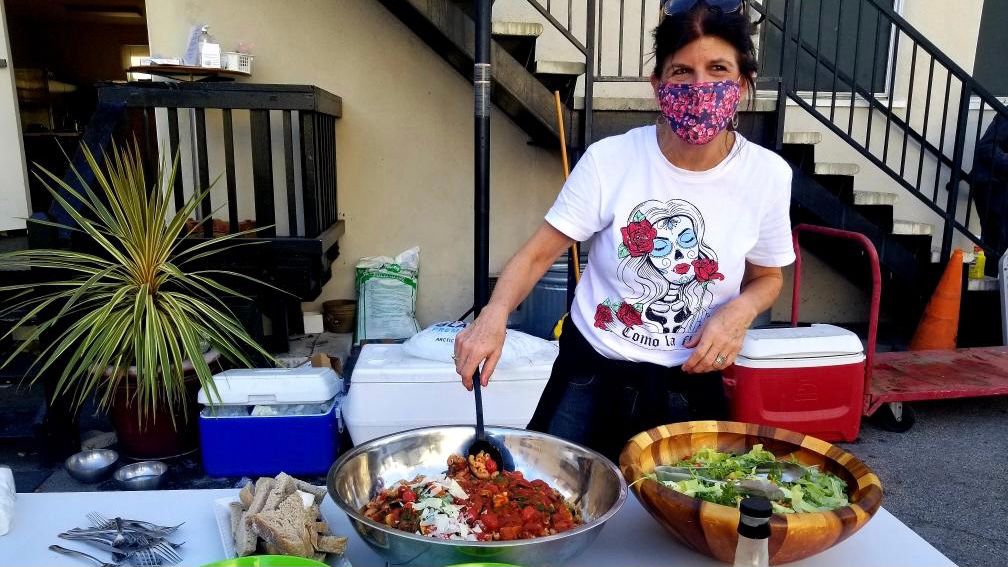Thirty million adults and 17 million children are currently food insecure, and more than one in five Latino and Black households say they do not have enough to eat, according to the U.S. Department of Agriculture. Yet almost a third of all food sold in the U.S. is thrown away.
"Food waste is such a huge issue during the pandemic when so many people are hungry," said Nancy Beyda, founder and CEO of the nonprofit FoodCycle – a group that diverts food waste from grocery stores and bakeries and redistributes it to Angelenos who are hungry.
Reclaiming bruised apples from Trader Joe's, almost-expired baked goods from Sprouts, along with meats, milk, and packaged goods from various grocers big and small, FoodCycle distributed 1.5 million meals last year alone.
"The pandemic has been a huge time of growth for us because we've been responding to the increase in food insecurity around the city, particularly among children, the elderly, and communities that are food deserts in South L.A.," Beyda said.
She estimates her organization has grown 1,000% due to COVID-19. In 2019, FoodCycle had 30 volunteers. Now it has more than 230 who drive around town picking up food before it's thrown away and bringing it to homeless shelters, churches, and individuals living on the street.
Marie Kovacs is one of them. A chef who lives in Santa Monica ran a catering business until the COVID-19 pandemic hit. Now she "refurbishes ugly wasted food into delicious meals," she said.
Using the kitchen at Hope United L.A. church in Santa Monica and reclaimed ingredients from FoodCycle, she cooks meals for 140 families each week. She also personally delivers food to people living in RVs and tents.
"I go to Reed Park. I drive up and down Rose Avenue. I go to the beach and drive under the freeway, where ten families are living. There's a lot that needs to be done," said Kovacs, who delivers meals seven days a week.
"It's overwhelming. There are thousands of people who have nowhere to go for a shower, a hot meal. Nowhere they can get anything. They're literally in the garbage can, and the funny thing is there is so much food out there."
A lot of the foods Kovacs and other volunteers deliver to those who are hungry are provided to FoodCycle from Trader Joe's, which has been working with the group for the past six months. Fridays, Saturdays, and Sundays, Foodcycle volunteers pick up fruits, vegetables, non-alcoholic beverages, baked goods, and prepared meals that are imperfect or one to two days shy of their expiration dates.
Since last summer, a single Trader Joe's location at the University of Southern California Village has donated $310,000 worth of food and beverages to FoodCycle and other groups that help share it with those in need.
"It's great because it's stuff that's still edible," said R.J. Musulas, captain of the USC Village Trader Joe's. "People forget that most of the stuff we sell is not made in a factory. It's mother nature, and some stuff does unfortunately come in a little less than perfect. It's great those fruits and vegetables get used up even though they may not sell in store."
Redistributing the foods locally in Skid Row, Compton, and other parts of South L.A. is a bonus "that positively affects our neighborhood," said Musulas, who also volunteers with some of his Trader Joe's staff at food banks.
FoodCycle started 15 years ago with a group who met in yoga class. In an effort to practice seva, or selfless service, they started picking up leftover food from a Beverly Hills grocery store and delivering it to a homeless shelter for women and children.
"It was eye-opening for me because there would be massive quantities of perfectly good food thrown away," Beyda said. "Sometimes you'd look at it and say, 'I honestly don't know what's wrong with this apple.' The fact that it was thrown in the trash was, to me, unbelievable."
FoodCycle was an informal collection of volunteers until 2014 when it became an official nonprofit and partnered with the city of L.A.'s Recycle program and started getting paid to pick up food waste and redistribute it to those in need. Some of those deliveries are now being done in all-electric Maxwell vehicles converted from older delivery vans retrofit with motors and batteries from wrecked Teslas.
By rescuing food waste to feed the hungry, Beyda began to realize there was also a climate impact. Not only does landfilled food generate methane — a greenhouse gas 25 times more potent than carbon dioxide — it is also a waste of the water, land, and energy used to grow and transport it.
"In the past year, we tried to be more visionary and more big-picture thinkers," Beyda said.
To reach as many people as possible, FoodCycle now uses an app called Food Oasis to find the organizations providing free meals so its volunteers can help supply food from nearby grocers and pastry shops.
"The app is how we can get these small places. We can't necessarily send our driver and truck to every little bakery, but we can figure out how to give volunteers the opportunity to help out," said Beyda, adding that her group works with about 80 food suppliers.
The need for food continues to be dire. The nonprofit food bank network, Feeding America, says that many of its member organizations saw a 60% increase in demand due to COVID-19 last year – a trend it expects will continue well into 2021.



